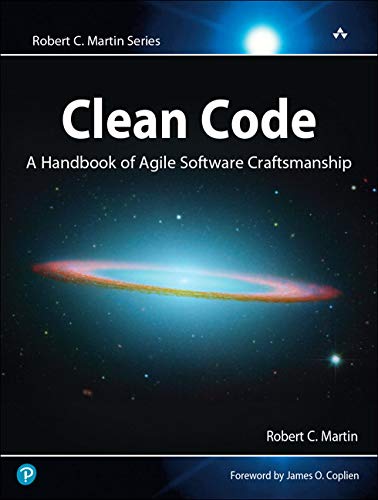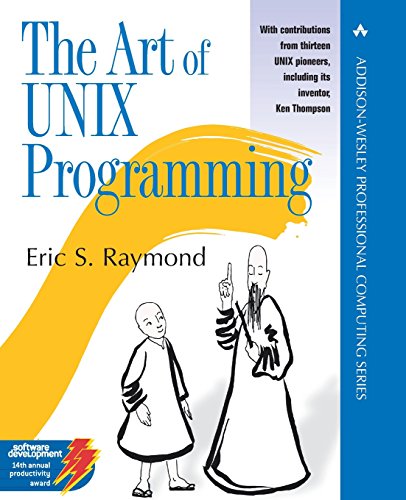What are
/r/muchinteresting's
favorite Products & Services?
From 3.5 billion Reddit comments
The most popular Products mentioned in /r/muchinteresting:
The most popular Services mentioned in /r/muchinteresting:
Zenkit
Medium
HackADay
Hacker News
Indeed
The most popular reviews in /r/muchinteresting:
As someone who knows nothing about neural networks, this was pretty interesting. At around Line 36 it gets pretty complicated even though the author seems like he tried to make it as easy as possible to understand lol but I think get it.
There seems to be decent amount of luck involved if we want to have the lowest amount of iterations for the system to learn... at least for this example?
Wonder what graphing each call to nonlin would look like as you iterate through the loop.
Someone did something similar with Mario awhile back which was pretty awesome. Mario for the interested
The Pragmatic Programmer
by Andrew Hunt and David Thomas
Amazon Link: http://www.amazon.com/.../
Summary: (From Amazon.com)
> Programmers are craftspeople trained to use a certain set of tools (editors, object managers, version trackers) to generate a certain kind of product (programs) that will operate in some environment (operating systems on hardware assemblies). Like any other craft, computer programming has spawned a body of wisdom, most of which isn't taught at universities or in certification classes. Most programmers arrive at the so-called tricks of the trade over time, through independent experimentation. In The Pragmatic Programmer, Andrew Hunt and David Thomas codify many of the truths they've discovered during their respective careers as designers of software and writers of code.
Slowly working thru a "Seven Languages in Seven Weeks" book I picked up over break. It's from the Pragmatic Programmers series, so my guess is it might from the same crowd that did "The Pragmatic Programmer?" Anywho, it actually starts out with Ruby (and contiunes with Clojure, Haskell, Io, Prolog, Scala, and Erlang), and it's been pretty interesting getting used to some of the concepts I don't really use in C++ like mixins, closures/blocks, etc.
I also keep saying I'll get back into the game dev stuff, at least with attempting to do smaller stuff like path-finding or game loops, but my efforts have been pretty unfocused/discombobulated so far, mostly have just been reading around various things.
We sure do, and yes videos are work well.
We're fans of this subject and what gravitates around it, in our team. We wrote an article on the subject and we'd love your opinion:
https://zenkit.com/en/blog/kanban-vs-scrum/
Ruby is cool, but as you learn I would make sure you focus on learning the concepts rather than specific language and implementation things since that changes pretty quick. https://news.ycombinator.com/item?id=8644822. I started out doing ASP, moved to php, gone through various .NET/java/python/ruby frameworks, and more recently do most things with the MEAN stack, and the stuff that carries over are things like the higher level architectural tradeoffs, general software design, and lower level HTTP and networking types of stuff.
Yeah, all of the above have applied with the primary factor being different in different cases. Most often I would say I do things just for the sake of playing around with something new though. I generally keep up with the latest languages and frameworks coming out and am a bit obsessive about at least doing the hello world (or todo list on web frameworks) tutorial for everything to see if it's something I want to pursue. I have written some of my basic stock tracking pages about 5 different times in various languages/frameworks too since it's something a little more complex than the todo app and exposes pain points that you don't see on the todo app.
Fortunately, it's not mutually exclusive with having direct applications though. Things popup on the radar a lot of times because I see that there are a lot of jobs coming up with that thing (http://www.indeed.com/jobtrends) or that it is relevant to a specific problem I want to solve at the time. It is also nice that a lot of times you can take an approach from one thing and apply it to others to stay on the forefront. One example is ASP.NET started out very much like basic php where you interwove some dynamic code into your html to make a dynamic page. After MVW frameworks like Ruby on Rails or Django came out, a lot of people started coding .NET stuff to that type of pattern. It was such a good idea that .NET eventually added it as a built in MVC library, but if you didn't follow general web dev stuff you probably wouldn't have seen it coming and would have been a couple years behind with your design.
The Linux Programming Interface: A Linux and UNIX System Programming Handbook
by Michael Kerrisk
Summary: >The Linux Programming Interface is the definitive guide to the Linux and UNIX programming interface—the interface employed by nearly every application that runs on a Linux or UNIX system. > >In this authoritative work, Linux programming expert Michael Kerrisk provides detailed descriptions of the system calls and library functions that you need in order to master the craft of system programming, and accompanies his explanations with clear, complete example programs.
Another book that's widely regarded as a must read for devs is Code Complete. It goes over everything from design, testing, and lower level programming stuff all the way up to integration and project management types of things. The downside is that it's something like 1000 pages, but it's very readable.
http://www.amazon.com/Code-Complete-Practical-Handbook-Construction/dp/0735619670
One of the best books I've read thus far has been The Pragmatic Programmer. This book has a plethura of tips to help you become a better developer and lots of examples to help you see the benefit behind each tip. It is definitely worth a read, so if you haven't read it, I highly recommend you do!
I have a copy if anyone would like to borrow it.
http://www.amazon.com/The-Pragmatic-Programmer-Journeyman-Master/dp/020161622X
EDIT: Updated to include link.
I actually just finished reading Jeff Sutherland's latest book about scrum and it was amazing to read his thought on the process and why certain aspects of scrum were designed in particular ways. It really help to reframe my understanding of the process and roles/responsibilities of each team member.
This article touches on some fo those points, but hearing the rationale behind each topic definitely helps with understanding
if anyone's interested: Amazon Link
The Art of UNIX Programming
by Eric S. Raymond
Summary: >The Art of UNIX Programming poses the belief that understanding the unwritten UNIX engineering tradition and mastering its design patterns will help programmers of all stripes to become better programmers. This book attempts to capture the engineering wisdom and design philosophy of the UNIX, Linux, and Open Source software development community as it has evolved over the past three decades, and as it is applied today by the most experienced programmers. Eric Raymond offers the next generation of "hackers" the unique opportunity to learn the connection between UNIX philosophy and practice through careful case studies of the very best UNIX/Linux programs.
The Linux Programming Interface: A Linux and UNIX System Programming Handbook
by Michael Kerrisk
Summary: >The Linux Programming Interface is the definitive guide to the Linux and UNIX programming interface—the interface employed by nearly every application that runs on a Linux or UNIX system. > >In this authoritative work, Linux programming expert Michael Kerrisk provides detailed descriptions of the system calls and library functions that you need in order to master the craft of system programming, and accompanies his explanations with clear, complete example programs.
oh yeah, i can bring it in if you wanna read it. it was this one: http://www.amazon.com/Game-Programming-Gems-CD/dp/1584500492
i have one of these if anyone wants it: http://www.amazon.com/Game-Engine-Architecture-Jason-Gregory/dp/1568814135/
Another book that's widely regarded as a must read for devs is Code Complete. It goes over everything from design, testing, and lower level programming stuff all the way up to integration and project management types of things. The downside is that it's something like 1000 pages, but it's very readable.
http://www.amazon.com/Code-Complete-Practical-Handbook-Construction/dp/0735619670
"Effective C++: 55 Specific Ways to Improve Your Programs and Designs" - took a "professional C++" course where this was the textbook and still have the paperback somewhere for borrowing
http://www.amazon.com/Effective-Specific-Improve-Programs-Designs/dp/0321334876
One of the best books I've read thus far has been The Pragmatic Programmer. This book has a plethura of tips to help you become a better developer and lots of examples to help you see the benefit behind each tip. It is definitely worth a read, so if you haven't read it, I highly recommend you do!
I have a copy if anyone would like to borrow it.
http://www.amazon.com/The-Pragmatic-Programmer-Journeyman-Master/dp/020161622X
EDIT: Updated to include link.







